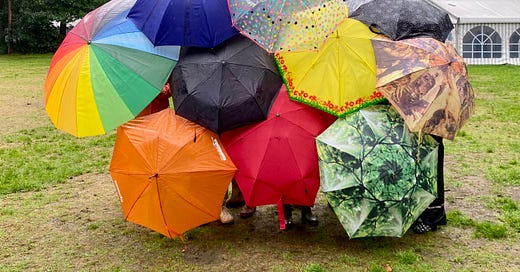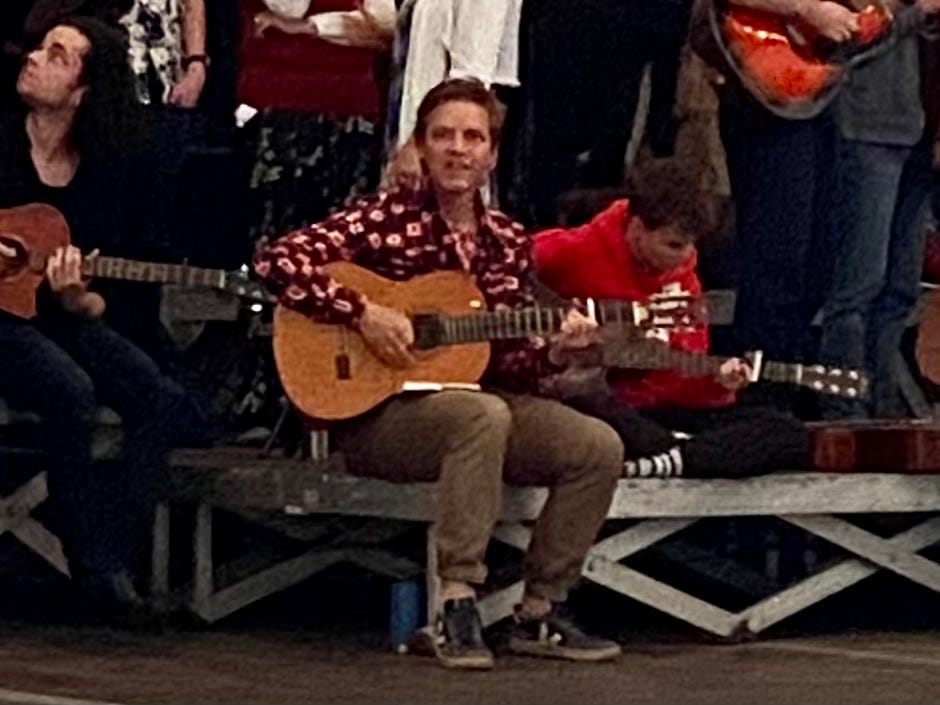#109 Techno
More and more and more (I don’t know where we’re going to). — Captain Hollywood Project
Last week marked my third visit to Buitenkunst, the art camp where I bravely sung Beyoncé and Bruno Mars tunes previously. This year, our week coincided with a relentless 90mm of rainfall, turning the grounds into the muddy mess that reminded me of my youthful festival days. Amidst the rain, I indulged in a morning rave, played a tango, and explored various forms of protest.
Let's start with the morning rave. It had been ages (possibly decades) since I last attended a rave at any time of day, let alone a morning one. The concept is quite simple: a rave without alcohol or drugs, guided by an enthusiastic facilitator who insists you keep moving. Our dance leader, Lodewijk van Dijk, a dancer and performer with the mantra "go hard or go home," took charge. For two hours, along with fifty strangers, I danced with an intensity that surpassed any previous experience, fueled by Ki/Ki's recorded techno set. There was no rest, no break, and certainly no going home. Our collective energy turned the tent into a sauna, our sweat-filled mist emulating smoke machines. It was an enchanting, transformative encounter. My heart rate raced at 155 bpm, just a touch below the music's tempo. The promise of a high was delivered, and it surpassed any high from my previous muddy festival experiences.
Techno stands as a pinnacle of human development, merging the industrial and post-industrial vibes of Detroit with Berlin's moody club scene and complex history. Unlike some other electronic genres, techno, I believe, isn't hedonistic. Instead, it champions inclusivity, unity, and resistance to mainstream norms. Check out 99pi's podcast on how techno united Berlin before politics did (“Tanz tanz revolution.” You’ll have to Google it as somehow Substack refuses to add links). Despite its underground nature, the genre holds considerable sway. As a counter to our consumer-driven society, it might just hold the key to our redemption.
At Buitenkunst, every day, facilitators present their creative plans for the day ahead. The camp offers programs in visual arts, theater, dance, music, and creative writing, led by artists and professionals. Occasionally, they collaborate across disciplines for workshops that transcend genres. In the evenings, some workshops' participants showcase their work, making those nights the highlight of the week for me. Each day's end turns into a mini-festival, welcoming kids as well. The anticipation of the unknown makes it even more exciting.
I had a few goals in mind for my time at Buitenkunst. One of them was playing guitar during an evening show. Chance had it that, on Thursday, three facilitators joined forces to interpret a tango song. With a group of 160 dancers, singers, and musicians, we brought Erwin Schrott's "Rojotango" to life. I played the guitar, despite it being a couple of notches above my current skill level. Thanks to the assistance of my fellow guitarists, I managed quite well (minus a few tricky Aø and B7(d9) chords). Orchestrated by music teacher Jesse Brouwer, choreographed by dance instructor Johanna Sauër, and directed by singing facilitator Isabel Pronk, the performance took center stage that night, and I cherished every moment of it.
On another day, in the theater department, we immersed ourselves in exploring different forms of protest and applying them to minor causes within the camp. We playfully "abducted" the voluntary donation box for the freezers, staged a peaceful sit-in against “overpriced” (ten euro) festival shirts (curse you, capitalism!), and disrupted theatrical elections through silent protests, counter campaigns, and even a streaking incident.
Naturally, such activities sparked discussions about our responsibility to combat injustice and advocate for a sustainable planet. Younger participants voiced doubts about bringing children into a world in crisis, while we older folks justified expanding our families in a crowded world. I faced several inquiries about my choice to work for a major polluter and the role protesters have in keeping such a company focused.
More than in previous years, these questions lingered in my mind throughout the week. Balancing enjoyment with the urgent need for action weighed on me. Can we have fun amidst such pressing tasks? Is there room for art as we fight to save the Earth? Will our efforts be enough to allow guilt-free dancing and music-making in my lifetime?
By Friday, I was utterly drained. Opting out of the scheduled program, I went for a run through the forest surrounding the camp. Inspired, I listened to a techno set. The forest houses a radio telescope, complete with a radiation exclusion zone. I've jogged through this forest countless times before, while editing De Tegentijd or clearing my mind, but this was a novel experience. Along the winding paths, I encountered deer and the telescope's discs, all while keeping pace with the beat. As industrial as the music was, it perfectly synced with the tranquil industriousness of the trees, ferns, and fungi.
I believe that if we ever send another compilation of human achievements into space, it should feature a techno set instead of the likes of Beethoven, Bach (on Voyager) or Chuck Berry (New Horizons). This choice would instantly convey our technological and cultural progress to extraterrestrial beings, along with our potential to surmount our challenge ahead. Having undoubtedly faced their own reckoning with rapid technological advancement and ecological turmoil, the aliens would appreciate the significance of techno. By listening, they could gauge if our culture possesses the strength to navigate the upcoming decades. Our response now will determine whether we're on target. These beings will possess the answers to the questions that consumed me all week. And based on that, they can decide whether to initiate contact or await the emergence of the next intelligent species on Earth. More and more and more.
Wishing you a fantastic summer (if you're in the northern hemisphere),
— Jasper




